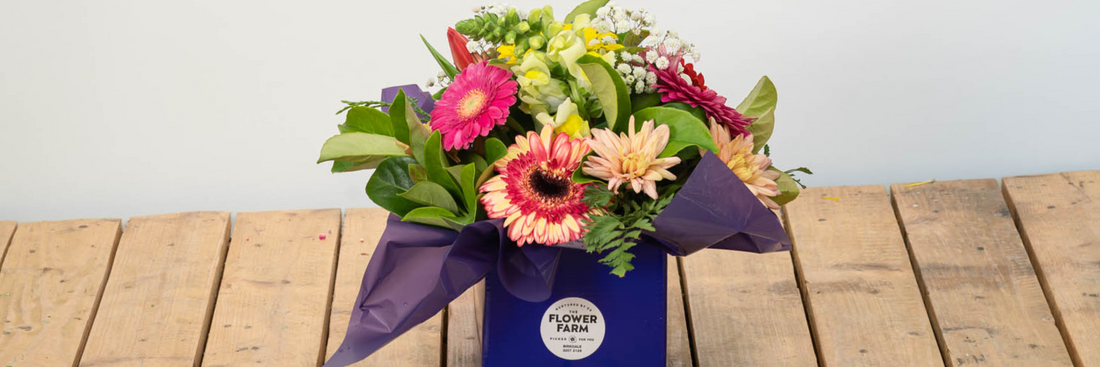
On a small patch of land in the Redlands back in 1978, Tarsem and Harbans Sihota planted a small crop of carnations just in time for Mother’s Day. This small plot then became something special. It became a seasonal, sustainable micro flower farm that the locals went wild for. Of course, they didn’t refer to it as a micro farm.
Fast-forward to 2024, and it seems that the love for small and local is back. It’s a trend that consumers are putting their money behind, supporting smaller growers with a farm-to-table – or should we say farm-to-vase – ethos.
Considering the sad state of the Australian flower industry in recent times, micro flower farms could be the way forward to get the domestic industry back to blooming good health. Let’s explore why.
What is a micro flower farm?

When we talk about a micro flower farm, we typically mean one on a smaller plot of land, that’s being run with a drive to take care of soil health. This means that the growers are focusing on growing seasonal flowers with minimal chemical intervention such as pesticides and fertilisers. Instead they are simply focused on sustainable, environmentally beneficial, bee-friendly farming practices that yield the most beautiful and freshest blooms.
Micro flower farmers tend to also embrace the 'grown not flown' approach, in an effort to minimise their carbon footprint and environmental impact. They understand the value of prioritising the long-term health of our land and bodies, rather than buying into the cheap, imported flowers bought from giant companies.
Micro flower farms are typically small family businesses with big hearts, just like The Flower Farm. They aim to grow small amounts of quality flowers that will not only minimise wastage but also serve their local community. (Not to mention they look and smell better, and last longer too!)
Why does the Australian flower industry need help?

The Australian flower industry has long been at the mercy of imported flowers grown on continents like Africa, Asia and South America. These are then picked, frozen or refrigerated then flown to florists, supermarkets and petrol stations in Australia to be sold at super low prices.
Of course, the quality of these thawed products isn’t great. But the competitiveness of their prices has already put a lot of local flower farms out of business.
The COVID19 pandemic proved to be a double-edged sword for growers. It meant that many orders were cancelled overnight as events were put on hold and offices closed. But it also meant that the influx of imported flowers slowed.
Local Australian growers eagerly stepped in to fill the gap, paving the way for a rise in micro flower farms across Australia. This trend has continued. Even as the world has largely returned to normal, consumers are continuing to support smaller, local operations.
This push for Australian-grown flowers is also supported by the Flower Industry Australia via campaigns such as the introduction of biodegradable country-of-origin bands.
Are micro flower farms the way forward?

Interestingly, the slow flower movement has come later than the slow food movement. And here in Australia we have been a little later in our uptake than other parts of the world. But now the ‘grown not flown’ approach is quickly winning over the public. And it is likely to be a trend that only keeps growing.
This approach to growing flowers with minimal chemicals and letting nature dictate what thrives in a certain area is not only vital to our own health, but also that of the Australian land. By showing consumers what beauty can be produced when working with the seasons and soil, it is hoped that more people will learn to understand the importance of embracing sustainability.
The pandemic taught us that it is important to source local and support each other, which is exactly what this movement is all about.
Where to find a quality micro flower farm?

The Flower Farm is a family business where seasonality and sustainability is prioritised. Flowers are sown by hand, picked by hand and styled by hand. Several generations work together on this Birkdale plot, ensuring that flowers are raised in their correct environments to achieve the best quality possible.
Any flowers that are not in season or suited to the Brisbane climate (for example irises and tulips) are sourced directly from select, trusted growers. This means no over-handling or storage is required.
Our team of farmer-florists work hard to ensure the sustainability and health of our Birkdale soil. We offer a range of seasonal bunches, including mixed carnations and bright daily beauties, and seasonal arrangements, such as these joyful gerbera designs.
Get in touch to find out what’s in season now!

